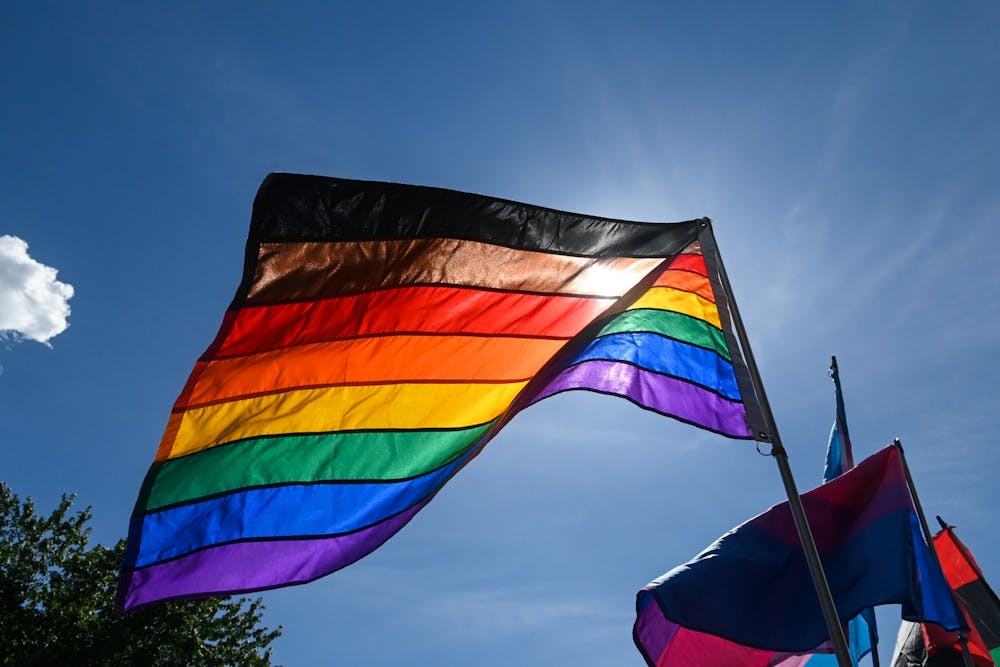
The Supreme Court ruled that discrimination on the basis of sexual orientation or gender identity is illegal.
Credit: Kylie CooperThe U.S. Supreme Court ruled on June 15 that a federal civil rights law will protect gay, lesbian, bisexual, and transgender people in the workplace, marking the first major decision on transgender rights and a milestone for the LGBT community.
Prior to the 6-3 decision, 28 states, including Pennsylvania, had not explicitly banned workplace discrimination towards LGBT people.
Though Penn and the city of Philadelphia had already implemented nondiscrimination ordinances for LGBTQ+ individuals, Director of Penn's LGBT Center Dr. Erin Cross said she believes Monday's landmark decision will still have a major impact on the Penn community.
The decision will benefit students who live in states that did not previously have LGBTQ+ workplace protections in place, Cross said. The ruling also expands the number of states where LGBTQ+-identifying Penn seniors may consider applying for jobs after graduation.
“The decision was remarkable,” Cross said. “It still hasn't settled in on some level. I never thought this would happen during my lifetime.”
Monday's ruling, which extended protections under the Title VII of the Civil Rights Act of 1964, is a move against 1968 Wharton graduate and President Donald Trump's administration, which argued in 2019 that the civil rights law should not protect individuals from being fired or facing workplace discrimination on the basis of their sexual orientation.
Cross believes the decision will have a broader impact on the LGBTQ+ community than the 2015 legalization of same-sex marriage, as more people will now be able to find employment and financially provide for themselves. This development is particularly important for members of the transgender community, she said, who are historically disproportionately unemployed.
More than one in four transgender people have lost a job due to workplace bias, and more than 75% have experienced workplace discrimination. Transgender individuals, especially transgender people of color, commonly face refusals to hire, harassment, physical and sexual violence, and other forms of discrimination, leading to high rates of unemployment and poverty.
In July 2019, a former employee of the Hospital at the University of Pennsylvania filed a lawsuit, claiming that she had been fired on the basis of her transgender identity. Though the case was withdrawn last November, the recent Supreme Court ruling has allowed for a new settlement hearing that will be held on July 20. The hearing comes because the Supreme Court ruling mandates sexual orientation and gender identity be included within Pennsylvania’s statewide anti-discrimination protections.
“An employer who fires an individual merely for being gay or transgender defies the law,” Justice Neil Gorsuch wrote in the majority decision, which comes from a majority conservative court.
Associate Director of the LGBT Center Malik Muhammad said he was pleasantly surprised by the decision and appreciates the decades of activism that led to this moment.
Muhammad said he hopes the Supreme Court's ruling will emphasize that Penn’s LGBTQ+ community, from students to faculty and staff, are safe to share their identity in the workplace if they choose to do so, adding that some LGBTQ+-identifying faculty and staff have not yet felt comfortable to come out on campus.
“If faculty and staff have the chance to share and be open and honest with [their identities] more, that reflects on to the students and it opens up an opportunity for students to understand how they can come into a space and live authentically and fully,” Muhammad said.
Nationwide, it is estimated that more than 11 million adults — 4.5% of American adults — 18 and older identify as LGBT, according to a 2017 Gallup report.
Though Cross and Muhammad both said they are thrilled by the court’s decision, they emphasized that there is more work to be done toward ensuring equality for the LGBTQ+ community, including providing equal access to housing and healthcare.
On June 12, the four-year anniversary of the Pulse Nightclub mass shooting, Trump erased transgender health protections that were included under the Affordable Care Act enacted by the Obama administration in 2010.
While Muhammad said Trump’s decision to erase transgender health protections was a "disheartening" derailing of LGBT rights, he said he is proud of the Penn Student Insurance Plan’s extensive coverage of procedures for transgender students. He said he wants to see this kind of coverage on a national scale and hopes that Penn will continue to lead by example, not only in the fight for LGBTQ+ equality, but also the fight for racial equality.
“We revel in our win, especially for this Pride Month, but the fight lives on,” Muhammad said.
The Daily Pennsylvanian is an independent, student-run newspaper. Please consider making a donation to support the coverage that shapes the University. Your generosity ensures a future of strong journalism at Penn.
Donate



